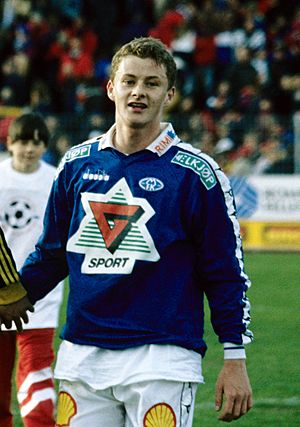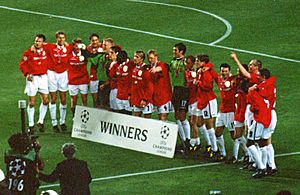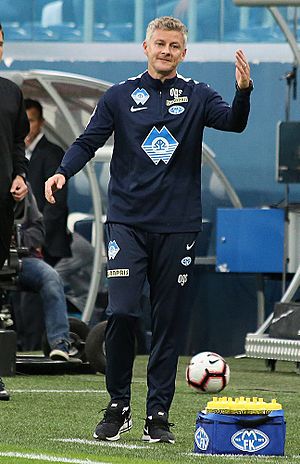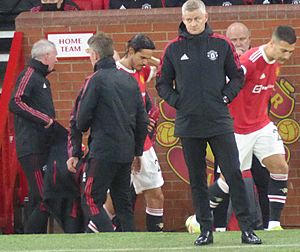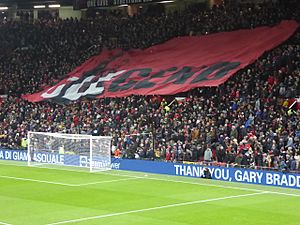Ole Gunnar Solskjær facts for kids
Ole Gunnar Solskjær (born 26 February 1973) is a Norwegian football manager and former player. He is currently the head coach for the Turkish club Beşiktaş. Solskjær spent most of his playing career as a forward for Manchester United, where he became famous for scoring important goals, often after coming on as a substitute. He also played 67 times for the Norway national team.
He started his career in Norway with Clausenengen, scoring many goals. Then he moved to Molde, helping them achieve great results. In 1996, he joined Manchester United for £1.5 million. Fans nicknamed him "the Baby-faced Assassin" because of his youthful looks and amazing goal-scoring ability. He played 366 games for United, scoring 126 goals. He was known as a "super-sub" for his knack of scoring late goals. His most famous goal was the dramatic winner against Bayern Munich in the 1999 UEFA Champions League final. This goal helped United win the "treble" – three major trophies in one season. After a serious knee injury in 2003, he retired from playing in 2007.
After retiring, Solskjær coached Manchester United's reserve team. He then managed his former club, Molde, leading them to their first-ever league titles in 2011 and 2012. He also won the Norwegian Football Cup in 2013. In 2014, he managed Cardiff City in the Premier League. In late 2018, he returned to Manchester United as a temporary manager. After a great start, he was given the job permanently in March 2019. He led United to the 2021 UEFA Europa League final but was sacked in November 2021 after a difficult period. In January 2025, Solskjær became the manager of Turkish club Beşiktaş.
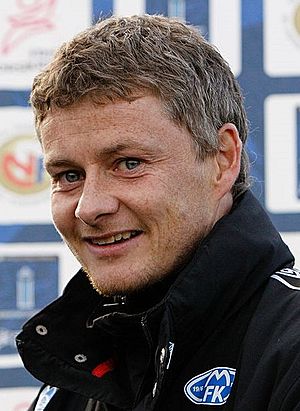
Solskjær in 2011
|
|||
| Personal information | |||
|---|---|---|---|
| Full name | Ole Gunnar Solskjær | ||
| Date of birth | 26 February 1973 | ||
| Place of birth | Kristiansund, Norway | ||
| Height | 1.78 m (5 ft 10 in) | ||
| Position(s) | Forward | ||
| Team information | |||
|
Current team
|
Beşiktaş (head coach) | ||
| Youth career | |||
| 1980–1990 | Clausenengen | ||
| Senior career* | |||
| Years | Team | Apps | (Gls) |
| 1990–1995 | Clausenengen | 109 | (115) |
| 1995–1996 | Molde | 42 | (31) |
| 1996–2007 | Manchester United | 235 | (91) |
| Total | 386 | (237) | |
| International career | |||
| 1994–1995 | Norway U21 | 19 | (13) |
| 1995–2007 | Norway | 67 | (23) |
| Managerial career | |||
| 2011–2014 | Molde | ||
| 2014 | Cardiff City | ||
| 2015–2018 | Molde | ||
| 2018–2021 | Manchester United | ||
| 2025– | Beşiktaş | ||
| *Club domestic league appearances and goals | |||
Contents
Early Life and Beginnings
Ole Gunnar Solskjær was born on 26 February 1973 in Kristiansund, Norway. His father, Øyvind, was a champion in Greco-Roman wrestling. Ole started playing football for his local club, Clausenengen, when he was seven years old.
Between the ages of eight and ten, he also trained as a Greco-Roman wrestler, just like his father. However, he decided to focus on football because he was "tossed around too much" in wrestling.
Playing Career
Starting Out at Clausenengen
Solskjær made his debut for Clausenengen (CFK) at 17 in 1990. He was an incredible goal scorer for the club. In five seasons, he scored 115 goals in 109 league games. This amazing record helped Clausenengen get promoted to a higher division in 1993.
Moving to Molde
In February 1995, Solskjær joined Molde, a team that had just been promoted to Norway's top league. He quickly made an impact, scoring two goals in his first game and a hat-trick (three goals) in his second. His goals helped Molde finish second in the league and qualify for the UEFA Cup, a European competition.
He played his last game for Molde in July 1996, scoring a goal and throwing his shirt to the crowd as a goodbye. He finished his time at Molde with 41 goals in 54 games.
Joining Manchester United
In July 1996, Solskjær joined Manchester United for £1.5 million. This was a surprise signing because he wasn't well-known outside Norway. He was given the number 20 shirt, which he kept for his entire United career.
First Season Success (1996–97)
Solskjær scored just six minutes into his debut for Manchester United in August 1996. He quickly showed he was a key player. He scored 18 Premier League goals in his first season, making him the club's top scorer that year. Manchester United won the Premier League title, giving Solskjær his first major trophy in England. The British media nicknamed him "the Baby-faced Assassin" because of his young looks and sharp finishing.
The Treble Season (1998–99)
Solskjær stayed at Old Trafford even though other clubs wanted to sign him. He scored many important goals during the 1998–99 season. In one famous game against Nottingham Forest, he came off the bench and scored four goals in just 12 minutes!
Manchester United won the Premier League title on the last day of the season. A week later, they won the FA Cup final, completing the "double" (two major trophies).
The biggest moment came on 26 May 1999, in the 1999 UEFA Champions League final against Bayern Munich. United were losing 1–0 as the game entered injury time. Teddy Sheringham scored to make it 1–1. Then, just moments later, Solskjær poked the ball into the net from a corner kick, winning the game 2–1! This incredible goal secured the "treble" for United, meaning they won the Premier League, FA Cup, and Champions League all in one season. This goal made him a legend at the club.
Later Seasons and Injuries
Solskjær continued to score important goals for United in the following seasons. He helped them win more Premier League titles in 2000, 2001, and 2003. In the 2001–02 season, he had his best goal-scoring year since his debut, netting 17 league goals.
However, a serious knee injury in 2003 caused him to miss a lot of playing time. He had several operations and missed the entire 2004–05 season. Despite his injuries, United fans showed their support with a special banner at the stadium that read "20LEGEND" (he wore the number 20 shirt).
He made a comeback in the 2006–07 season, scoring goals again. He helped United win another Premier League title in 2007. However, he had to retire from professional football on 27 August 2007, due to his knee problems. He holds the record for the most goals scored for Manchester United as a substitute.
Testimonial Match
On 2 August 2008, a special match was played at Old Trafford to honor Solskjær. Almost 69,000 fans came to watch, showing how much he was loved by the supporters.
International Career
Solskjær made his debut for the Norway national team in November 1995. He scored in his first game, a 1–1 draw against Jamaica. He played for Norway in the 1998 FIFA World Cup and UEFA Euro 2000. He formed a strong attacking partnership with Tore André Flo.
He scored his last goals for Norway in September 2006, bringing his total to 23 goals. He played his final international game in February 2007, finishing with 67 appearances for his country.
Managerial Career
Coaching at Manchester United Reserves
After retiring as a player, Solskjær stayed at Manchester United. He coached the club's reserve team starting in 2008. He led the reserves to win several trophies, including the Lancashire Senior Cup and the Premier Reserve League North.
Managing Molde (First Spell)
In November 2010, Solskjær became the manager of his former club, Molde, in Norway. In his first year, he led Molde to win their first-ever Tippeligaen title in 2011. He repeated this success in 2012, winning the league for a second time. In 2013, he added the Norwegian Football Cup to Molde's trophy cabinet.
Managing Cardiff City
On 2 January 2014, Solskjær was appointed manager of Cardiff City, a team in the Premier League. Although they won his first game, Cardiff struggled and were relegated from the Premier League that season. He left the club in September 2014.
Returning to Molde (Second Spell)
Solskjær returned to Molde as manager in October 2015. He guided them to first place in their UEFA Europa League group, ahead of teams like Fenerbahçe and Ajax. Molde finished second in the Norwegian league in 2017 and 2018 under his leadership, qualifying for the Europa League again.
Managing Manchester United (2018–2021)
On 19 December 2018, Solskjær was appointed as the temporary manager of Manchester United after José Mourinho left. His first game was a 5–1 win against Cardiff City. He became the first United manager since Sir Matt Busby in 1946 to win his first five league games. His strong start earned him the Premier League Manager of the Month award for January 2019.
In March 2019, after winning 14 of his first 19 matches, Solskjær was given the Manchester United manager job permanently. He led the team to the 2021 UEFA Europa League final, where they lost on penalties to Villarreal. In the 2020–21 Premier League season, United finished second, their best league finish since Sir Alex Ferguson retired.
However, the 2021–22 season started with a difficult run of results. After a 5–0 home loss to Liverpool and a 4–1 defeat to Watford, Solskjær left his role as manager on 21 November 2021.
Managing Beşiktaş
On 18 January 2025, Solskjær was appointed head coach of Süper Lig club Beşiktaş in Turkey. His start with Beşiktaş was very positive, with eight wins and one draw in his first 12 games. This included a 2–1 victory in the derby against Galatasaray on 29 March 2025, who were undefeated leaders at the time.
Personal Life
Ole Gunnar Solskjær is married to Silje and they have three children: Noah, Karna, and Elijah. Noah and Karna are also footballers. Karna plays as a forward for AaFK Fortuna and has even played one senior game for Manchester United, making her and Ole the first father-daughter pair to play for the club.
In 2001, Solskjær became a UNICEF Goodwill Ambassador, helping children around the world. In 2008, he received the First Class Knighthood of the Royal Norwegian Order of St. Olav from the King of Norway, a very high honor. He was the youngest person ever to receive this award. In 2009, the Norwegian parliament gave him the Peer Gynt Prize for his work in sport and his commitment to society.
Honours
Player
Clausenengen
- 3. divisjon: 1993
Manchester United
- Premier League: 1996–97, 1998–99, 1999–2000, 2000–01, 2002–03, 2006–07
- FA Cup: 1998–99, 2003–04
- FA Charity/Community Shield: 1996, 2003
- UEFA Champions League: 1998–99
- Intercontinental Cup: 1999
Individual
- Kniksen Awards Kniksen of the Year: 1996
- Kniksen's honour award: 2007
Manager
Manchester United Reserves
- Lancashire Senior Cup: 2007–08
- Manchester Senior Cup: 2008–09
- Premier Reserve League North: 2009–10
- Premier Reserve League: 2009–10
Molde
- Tippeligaen: 2011, 2012
- Norwegian Football Cup: 2013
Manchester United
- UEFA Europa League runner-up: 2020–21
Individual
- Kniksen Award Coach of the Year: 2011, 2012
- Peer Gynt Prize: 2009 (for his efforts for football and philanthropy)
- Premier League Manager of the Month: January 2019
Orders
- Knight of the Order of St. Olav, First Class, 2008
See also
 In Spanish: Ole Gunnar Solskjær para niños
In Spanish: Ole Gunnar Solskjær para niños
 | Delilah Pierce |
 | Gordon Parks |
 | Augusta Savage |
 | Charles Ethan Porter |


